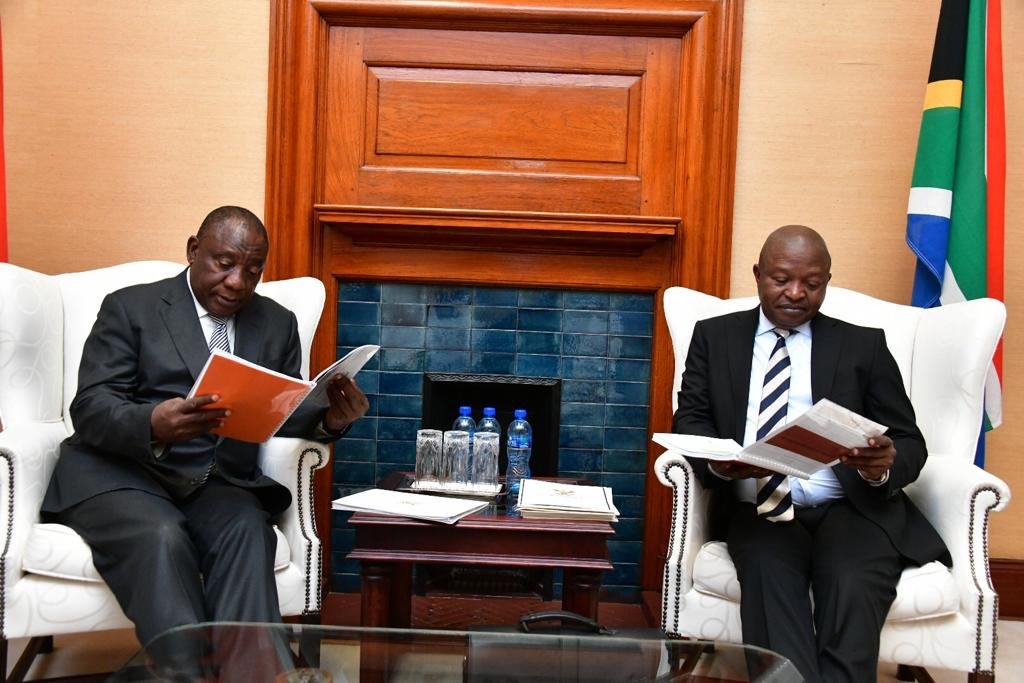


President Cyril Ramaphosa with deputy president David Mabuza.
- Both minister Gwede Mantashe and minister Thulas Nxesi have been hospitalised due to Covid-19.
- In terms of the Constitution, the president may temporarily assign their functions to any Cabinet member.
- The acting minister has the same powers as the minister and can, therefore, make decisions on their behalf in Cabinet.
Both Mineral Resources and Energy Minister Gwede Mantashe and Employment and Labour Minister Thulas Nxesi were hospitalised this week after they tested positive for Covid-19.
Minister in the Presidency Jackson Mthembu said they were admitted after being in self-quarantine for a week, and followed the advice of their medical doctors to take better care and to be monitored in hospital.
University of the Western Cape law professor Yonatan Fessha and University of Johannesburg political science expert Ayabulela Dlakavu both agree it is relatively simple for the president to temporarily assign the responsibilities of the ministers to their colleagues.
This means that the work of Cabinet should largely be unaffected.
Minister of Mineral Resources and Energy, Mr Gwede Mantashe, has been admitted to hospital on the advice of the family doctor for better medical attention and monitoring after testing positive for Covid-19 last week. https://t.co/y2x98EONEk
— Presidency | South Africa ???? (@PresidencyZA) July 20, 2020
Minister of Employment and Labour, Mr Thembelani ‘Thulas’ Nxesi, was admitted to hospital last night due to Covid-19, on the advice of his medical doctors, in order for him to have access to better medical attention and proper monitoring. https://t.co/ORQrlIYV2T
— Presidency | South Africa ???? (@PresidencyZA) July 21, 2020
News24 took a look at what happens to the work of the Cabinet when a minister gets sick, and who may take over their responsibilities while they are sick.
What happens to the responsibilities of a minister when they get sick?
Fessha told News24 when a minister gets sick, it would be assumed that a deputy minister will fulfil the role.
However, according to section 97 of the South African Constitution “the President may assign to a Cabinet member any power or function of another member who is absent from office or is unable to exercise that power or perform that function”.
OPINION | National command council has become a mild form of a junta
Cabinet only consists of ministers, the president and deputy president, and does not include deputy ministers.
Fessha said a proclamation is “arguably” not required by the president for this transfer to take effect.
Dlakavu told News24 that in terms of the Constitution an acting minister is afforded the same powers as a minister.
“Constitutionally, an acting minister is afforded equal executive status as the incumbent minister they are temporarily replacing.”
What happens to Cabinet when a minister is sick?
Dlakavu said since the president transfers the powers of a sick minister to another member of Cabinet, the acting minister is empowered to make decisions on behalf of the ill minister.
CYRIL RAMAPHOSA | There is a silver lining in the Covid-19 crisis
“By virtue of being afforded ministerial status as per the Constitution (recall section 97 of the Constitution), the acting minister is able to participate or contribute to collective Cabinet decisions.”
The quorum of Cabinet should therefore not be affected.
Fessha said “arguably” the principle of collective responsibility dictates that decisions of Cabinet remain binding on those ministers who did not attend the meeting due to being ill.
What will happen to the president’s roles if he gets sick?
Section 90 of the Constitution stipulates that when the president is not in the country or is unable to fulfil his presidential duties, he may be replaced by an acting president.
However, only the following people are eligible for the position of acting president: the deputy president; a minister designated by the president; a minister designated by the other members of Cabinet through a collective Cabinet decision; and the speaker of the National Assembly until the National Assembly designates one of its other members.
READ HERE | Mokgoro showing no Covid-19 symptoms as he completes last day of self-quarantine
Fessha said if a president is too ill and is temporarily unable to fulfil the duties of a president, the deputy president will likely be acting president.
“That person must be sworn in before he assumes responsibilities. An acting president has the responsibilities, powers and functions of the president,” Fessha said.
“But in terms of convention, the acting president usually plays a caretaker role and abstains from making major decisions.”

